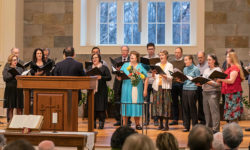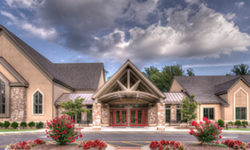
Making Sense of the Fall: Part 2
March 8, 2023 | Jim Neumann
Why did God create a world in which everything could so easily go so wrong? As I said in my previous post, this is ultimately a question that only God can answer. But he has given us revelation and reason enough to ponder the mystery, and even invites us to do so (Prov 25:2).
To begin with, we are faced with three possibilities:
- God decreed the Fall (John Calvin)
- God foresaw and allowed the Fall, but did not decree it (Augustine)
- God was surprised by the Fall and had to scramble to do something about it.
The final possibility is emphatically denied by Scripture, which repeatedly declares that God purposed our redemption in Christ before the foundation of the world, before the ages began (see Eph 1:3–6; Col 1:15–20; 2 Tim 1:9). God is not surprised by anything. So there are really only two possibilities: either God ordained the Fall, or he foresaw and allowed it. In either case, we will want to ask, “why?”
God Ordained the Fall: Calvin’s Perspective
According to Calvin, “God not only foresaw the fall of the first man, and in him the ruin of his posterity; but also at His own pleasure arranged it” (Institutes of the Christian Religion, 3.23.7). This is not to say that God ordained sin itself–a thought which is refuted throughout Scripture (see Pss 5:4; 92:15; Rom 9:14; Jam 1:13; 1 John 1:5). Calvin drew a sharp distinction between God willing or arranging Adam’s sin and actually coercing him to sin. But by virtue of the fact that God certainly foresaw the Fall and could have prevented it, and yet did not, Calvin reasoned that he must have willed it. If asked why God would do so, Calvin doubtless would have replied, “for the greater praise of his glory.”
That is to say, God also purposed from before creation to work through the Fall to bring about a more glorious state than even pre-Fall Eden via our redemption in Christ, and likewise enable in us a fuller realization of his grace.
One advantage of Calvin’s view is that nothing transpires outside of God’s express will. All things are accounted for by his providence. Yet for many, who do not accept Calvin’s distinction between willing and causing, this view still comes far too close to saying that God ordained sin.
God Foresaw and Allowed the Fall: Augustine’s Perspective
In Augustine’s view, centuries before Calvin, God indeed foresaw the Fall and allowed it, but he did not ordain it (see, e.g., City of God Book V). If asked why God would do so, Augustine and other theologians following in his wake would answer, “because he could and would, in his sovereignty, work even those acts done contrary to his will together to serve his good purposes in the end” (cf. Rom 8:28). On this view, God is able to allow Satan and others to act however they will; but because his own wisdom and power are greater, there is nothing they can do that will not ultimately feed into his own good purposes once again and nothing, therefore, that can actually thwart his will. J. R. R. Tolkien took up Augustine’s view in the opening chapter of The Silmarillion where Ilúvatar (i.e., God) tells Melkor (i.e., Satan), “no theme may be played that hath not its uttermost source in me, nor can any alter the music in my despite. For he that attempteth this shall prove but mine instrument in the devising of things more wonderful, which he himself hath not imagined.” In this regard, think of the cross. On its own, the crucifixion of Jesus was the evilest act in history; yet, in God’s hands, it became the instrument of something more wonderful than any had imagined (the resurrection).
One advantage of Augustine’s view is that God does not ordain anything evil, even though he does not restrain anyone from acting contrary to his will either. Yet, just as some do not accept Calvin’s distinction between willing (ordaining) and causing the Fall, some (like Calvin himself) do not accept Augustine’s distinction between allowing and ordaining.
O Happy Fall: A Common Perspective
Instead of arguing over points at which Augustine and Calvin differ, I would rather highlight where they agree. At the end of the day, both agree that a.) God made us able to fall; and b.) did so for a good purpose. This ultimately leads us to the ancient doctrine that the church fathers called the felix culpa: the “happy” or “fortunate fall”: the idea that through the Fall–and through the redemption that is in Christ Jesus–God has brought humanity and all creation to a more glorious place than where they began in Eden. Indeed, “God works all things together for good for those who love him, who are called according to his purpose” (Rom 8:28). This ancient doctrine makes an appearance in the modern hymn Fortunate Fall by Audrey Assad:
Oh happy fault, oh happy fault
That gained for us so great a Redeemer.
Fortunate fall, fortunate fall
That gained for us so great a Redeemer.
Fyodor Dostoevsky said it this way in The Brothers Karamazov:
I believe like a child that suffering will be healed and made up for, that all the humiliating absurdity of human contradictions will vanish like a pitiful mirage, that in the world’s finale something so precious will come to pass that it will suffice for all hearts, for the comforting of all resentments, for the atonement of all the crimes of humanity, for all the blood that they’ve shed; that it will make it possible not only to forgive but to justify all that has happened (my emphasis).
What is this thing that could possibly justify the fall and all that has resulted from it in history? It is the resurrection. It is the New Heaven and New Earth of Revelation 21–22. It is glory of a God who works all things together for good for those who love him. It is the everlasting knowledge of what we have been saved from, what we have been spared. We will understand how good God truly is for having known the opposite for a time.
Perhaps we cannot answer with certainty why God chose to create a world in which everything could so easily (and would) go so wrong. But we have every reason to trust that he did so for a good purpose and that we will see in retrospect that he has worked all things together for our good. Of this, the death and resurrection of Jesus are the proof.
If you’ve found these posts interesting, I would love to invite you to join my current Adult Education class: Made in the Image of God (meeting on Sunday mornings at 10:30 a.m. in the Sanctuary through April 2). All classes in this series are recorded and posted on SHC’s YouTube channel and the audio is available on our podcast stream (search “Stone Hill Church” wherever you get your podcasts).






